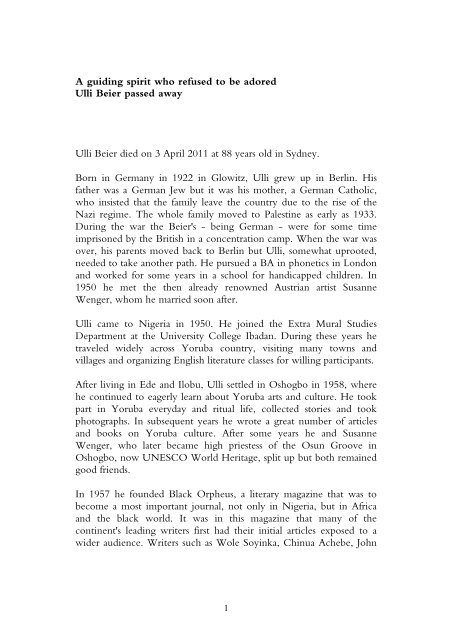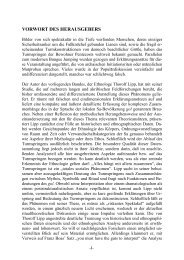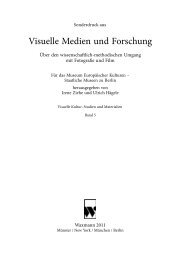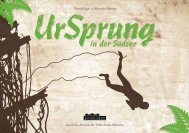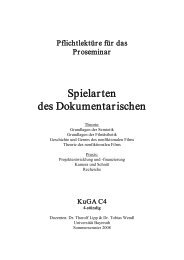A guiding spirit who refused to be adored Ulli Beier ... - Thorolf Lipp
A guiding spirit who refused to be adored Ulli Beier ... - Thorolf Lipp
A guiding spirit who refused to be adored Ulli Beier ... - Thorolf Lipp
Create successful ePaper yourself
Turn your PDF publications into a flip-book with our unique Google optimized e-Paper software.
A <strong>guiding</strong> <strong>spirit</strong> <strong>who</strong> <strong>refused</strong> <strong>to</strong> <strong>be</strong> <strong>adored</strong><br />
<strong>Ulli</strong> <strong>Beier</strong> passed away<br />
<strong>Ulli</strong> <strong>Beier</strong> died on 3 April 2011 at 88 years old in Sydney.<br />
Born in Germany in 1922 in Glowitz, <strong>Ulli</strong> grew up in Berlin. His<br />
father was a German Jew but it was his mother, a German Catholic,<br />
<strong>who</strong> insisted that the family leave the country due <strong>to</strong> the rise of the<br />
Nazi regime. The <strong>who</strong>le family moved <strong>to</strong> Palestine as early as 1933.<br />
During the war the <strong>Beier</strong>'s - <strong>be</strong>ing German - were for some time<br />
imprisoned by the British in a concentration camp. When the war was<br />
over, his parents moved back <strong>to</strong> Berlin but <strong>Ulli</strong>, somewhat uprooted,<br />
needed <strong>to</strong> take another path. He pursued a BA in phonetics in London<br />
and worked for some years in a school for handicapped children. In<br />
1950 he met the then already renowned Austrian artist Susanne<br />
Wenger, <strong>who</strong>m he married soon after.<br />
<strong>Ulli</strong> came <strong>to</strong> Nigeria in 1950. He joined the Extra Mural Studies<br />
Department at the University College Ibadan. During these years he<br />
traveled widely across Yoruba country, visiting many <strong>to</strong>wns and<br />
villages and organizing English literature classes for willing participants.<br />
After living in Ede and Ilobu, <strong>Ulli</strong> settled in Oshogbo in 1958, where<br />
he continued <strong>to</strong> eagerly learn about Yoruba arts and culture. He <strong>to</strong>ok<br />
part in Yoruba everyday and ritual life, collected s<strong>to</strong>ries and <strong>to</strong>ok<br />
pho<strong>to</strong>graphs. In subsequent years he wrote a great num<strong>be</strong>r of articles<br />
and books on Yoruba culture. After some years he and Susanne<br />
Wenger, <strong>who</strong> later <strong>be</strong>came high priestess of the Osun Groove in<br />
Oshogbo, now UNESCO World Heritage, split up but both remained<br />
good friends.<br />
In 1957 he founded Black Orpheus, a literary magazine that was <strong>to</strong><br />
<strong>be</strong>come a most important journal, not only in Nigeria, but in Africa<br />
and the black world. It was in this magazine that many of the<br />
continent's leading writers first had their initial articles exposed <strong>to</strong> a<br />
wider audience. Writers such as Wole Soyinka, Chinua Ache<strong>be</strong>, John<br />
1
Pepper Clark, the late Chris<strong>to</strong>pher Okigbo and others had some of<br />
their first texts published by Black Orpheus.<br />
<strong>Ulli</strong> later co-founded, <strong>to</strong>gether with Duro Ladipo, the legendary<br />
Mbari-Mbayo Artists and Writers Club in Ibadan which helped many<br />
an artist and writer of the time <strong>to</strong> get first recognition. Some might<br />
remem<strong>be</strong>r that <strong>Ulli</strong> wrote several texts, even plays, under the<br />
pseudonym Obotunde Ijimere. In the early sixties he was appointed<br />
Direc<strong>to</strong>r of the Institute of African Studies at the University of Ife.<br />
Together with his second wife, Georgina, he organized dozens of art<br />
workshops in Oshogbo and gave artists such as Twins Seven Seven,<br />
Muraina Oyelami, Rufus Ogundele, Bisi Fabunmi or Jimoh Buraimoh.<br />
In the seventies he was asked by the National Cultural Council of<br />
Papua New Guinea <strong>to</strong> found an Institute of Papua New Guinea<br />
Studies. After buying a house in Sydney and opting for the Australian<br />
citizenship, he accepted the call in 1974. There, he co-organized,<br />
<strong>to</strong>gether with his second wife, Georgina <strong>Beier</strong> - in every respect his<br />
equal companion - the country's first art exhibitions featuring artworks<br />
by Timothy Akis and Matias Kauage. <strong>Ulli</strong> then created the literary<br />
periodical Kovave: A Journal of New Guinea Literature, which<br />
reproduced works by Papua New Guinean artists. His efforts were<br />
equally significant in facilitating the emergence of Papua New Guinean<br />
literature. While in Papua New Guinea he encouraged Al<strong>be</strong>rt Maori<br />
Kiki <strong>to</strong> record his au<strong>to</strong>biography, which <strong>Beier</strong> transcri<strong>be</strong>d and edited.<br />
The book “Ten Thousand Years in a Lifetime” was one of the first<br />
literary works of a Papua New Guinean.<br />
<strong>Ulli</strong> returned <strong>to</strong> Germany in the early 80s <strong>to</strong> found IWALEWA Haus a<br />
centre for contemporary arts, mainly from Africa and Oceania, and part<br />
of Bayreuth University. He continued <strong>to</strong> play a role as an<br />
intermedia<strong>to</strong>r <strong>be</strong>tween peoples and cultures. With a brief interruption<br />
– and despite his age - he held this position until the end of 1996.<br />
During all this time he remained in close contact with his many friends<br />
from Africa, Australia, India, the Pacific and many other parts of the<br />
world <strong>who</strong> frequently visited IWALEWA Haus. It was a very fruitful<br />
time for <strong>Ulli</strong>, he published over a hundred brochures, articles, and<br />
books and curated dozens of exhibitions, workshops and concerts. He<br />
was a great facilita<strong>to</strong>r, enabling hundreds of people from different<br />
cultural backgrounds <strong>to</strong> get <strong>to</strong> know each other, work <strong>to</strong>gether,<br />
2
overcome prejudices. Thousands of visi<strong>to</strong>rs and guests have <strong>be</strong>nefited<br />
from <strong>Ulli</strong>'s work.<br />
In 1995 and again in 1997 he was invited by Epeli Hau’ofa <strong>to</strong> take up<br />
the position of a guest professor at the University of the South Pacific<br />
in the then newly founded Oceania Center for Arts and Culture. He,<br />
<strong>to</strong>gether with his wife Georgina, spent his last years in his house in<br />
Sydney, writing and publishing.<br />
In the early nineties, when I was <strong>Ulli</strong>’s student assistant at IWALEWA<br />
Haus, he mentioned a Yoruba proverb that I have never forgotten<br />
since: "If an old man dies don’t weep, but congratulate his family for that his<br />
life has come full circle."<br />
Back then I thought of this as a bit weird. But, by and by, I learned<br />
more such things both from <strong>Ulli</strong> and Georgina. Interestingly, many of<br />
these thoughts were never articulated verbally. They just resonated in<br />
IWALEWA Haus – and they still do:<br />
“Try <strong>to</strong> live a full life, but try not <strong>to</strong> live against its circle. Try <strong>to</strong> find out <strong>who</strong><br />
and what you are. Try <strong>to</strong> appreciate what you don’t understand. Try <strong>to</strong><br />
understand that understanding is not knowing. Try <strong>to</strong> learn, but try not <strong>to</strong><br />
<strong>be</strong>come a professional. Try <strong>to</strong> <strong>be</strong> proud about your achievements and appreciate<br />
that they are a gift of fate. Try <strong>to</strong> <strong>be</strong> aware that life will not last forever, but<br />
know that your physical and <strong>spirit</strong>ual actions will have an impact.”<br />
<strong>Ulli</strong> was my teacher, but never taught me. He was my men<strong>to</strong>r but,<br />
never sponsored me. He was my <strong>guiding</strong> <strong>spirit</strong>, but <strong>refused</strong> <strong>to</strong> <strong>be</strong><br />
<strong>adored</strong>. His life had a deep impact on mine. Now his life has ended.<br />
<strong>Ulli</strong> went full circle. Even though during his last years, the world that<br />
he inhabited was may<strong>be</strong> not quite the world that he lived in anymore.<br />
His legacy? I honestly think he never really wanted <strong>to</strong> have one. <strong>Ulli</strong>’s<br />
bibliography is amazing, but writing for him was not so much about<br />
making a particular career. Rather than academically reasoning about<br />
the people and cultures that he wrote on, he preferred <strong>to</strong> <strong>be</strong>come a<br />
part of them, was enriched by them and influenced them himself. He<br />
once <strong>to</strong>ld me that life was about living it. His writing and curating<br />
clearly reflected that.<br />
3
In Yoruba philosophy, physical death does not mean the complete<br />
cessation of a person’s <strong>spirit</strong>ual power. Especially those <strong>who</strong> die at ripe<br />
old age and <strong>who</strong> lived <strong>spirit</strong>ually well on earth, continue <strong>to</strong> <strong>be</strong> around.<br />
The colorful and dramatic Egungun ceremony is a wonderful symbol<br />
for this <strong>be</strong>lief.<br />
I was many times most warmly received and accommodated by <strong>Ulli</strong><br />
and Georgina in their home in Sydney. And even though <strong>to</strong>day I feel<br />
more gratitude than pain, it is hard <strong>to</strong> imagine the house without him.<br />
Yesterday Georgina wrote <strong>to</strong> me that <strong>Ulli</strong> is now traveling <strong>be</strong>tween<br />
the stars. I guess that, from time <strong>to</strong> time, he will come back as a<br />
colorful, jolly, yet dramatic and mighty Egungun. I hope <strong>to</strong> see him<br />
again. May<strong>be</strong> sometime in Yorubaland…<br />
My heart and thoughts are with Georgina, Sebastian and Tunji.<br />
<strong>Thorolf</strong> <strong>Lipp</strong>, cultural anthropologist and filmmaker, lecturer at Berlin Free<br />
University.<br />
Berlin, April 2011<br />
4


